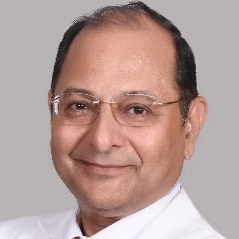
DR A C ANAND
Gastroenterologist
- Fees: INR 1,000
-
Monday 2:00 PM - 4:00 PM
(See all timing)Monday 2:00 PM - 4:00 PM,
Tuesday 2:00 PM - 4:00 PM,
Wednesday 2:00 PM - 4:00 PM,
Thursday 2:00 PM - 4:00 PM,
Friday 2:00 PM - 4:00 PM,
Saturday 2:00 PM - 4:00 PM
Introduction
Dr A C Anand is one of the best Neurologist in New Delhi and is currently associated with Indraprastha Apollo Hospitals.
Hospital Associations
Indraprastha Apollo Hospitals
Services/Interest
- Headache Management
- Epilepsy Treatment
- Stroke Management
- Neuro-rehabilitation
- Multiple Sclerosis Management
- Parkinson's Disease Management
- Alzheimer's Disease Management
- Migraine Management
- Sleep Disorder Management
- Neuro-immunology Treatment
- Neuromuscular Disorder Management
- Dementia Management
Experience
Dr A C Anand is one of the best Neurologist in New Delhi and has an overall experience of 51 years in the field.
Professional Memberships
Indian Society Of Gastroenterology, Indian Association For The Study Of Liver, Indian College Of Physicians, Mumbai, American College Of Physicians (USA), American College Of Gastroenterology, Virginia (USA).
Education
Dr A C Anand completed his MBBS from the University of Lucknow in 1975. Dr A C Anand completed his MD - General Medicine from the University of Pune in 1980. Dr A C Anand completed his DM - Gastroenterology from All India Institute Of Medical Sciences, New Delhi in 1988.
I Speak
English, Hindi
Feedback For Dr A C Anand
Write FeedbackIndraprastha Apollo Hospitals Timing
Monday - Friday
2:00 PM - 4:00 PM
Saturday
2:00 PM - 4:00 PM
Who is a gastroenterologist?
Gastroenterologists are the physicians who have extensive training in the diagnosis and treatment of conditions that affect the large intestine, small intestine, stomach, esophagus, and biliary system which is made up of liver, pancreas, gallbladder, bile ducts.
What does a gastroenterologist do?
Gastroenterologist primarily assesses the structure of the digestive tract and are experts in diseases of the digestive tract.
They specialize in the evaluation, diagnosis, and treatment of the following symptoms and conditions: Abdominal pain, bleeding in the digestive tract, colorectal cancer, stomach cancer, pancreatic cancer, liver cancer, constipation and diarrhea, difficulty swallowing, polyps, diverticular disease, Crohn's disease, gallbladder disease, irritable bowel syndrome (IBS), colitis, heartburn, GERD (gastroesophageal reflux disease), hemorrhoids, stomach upset, nausea, vomiting, and ulcers.
When should you see a gastroenterologist?
You should see a gastroenterologist if you're experiencing any of the following symptoms:
- Abdominal pain or bloating
- Bowel movement urges that are hard to control
- Changes in bowel habits
- Dark urine
- Diarrhea
- Esophageal pain
- Excessive gas or belching
- Heartburn (acid reflux)
- Leakage/underwear stains
- Lethargy
- Loss of appetite or weight
- Pale-colored stools
- Rectal bleeding
- Vomiting
What diseases do Gastroenterologists treat?
A gastroenterologist treats any condition affecting the gut, such as:
- Oesophagitis, gastritis, peptic ulcer disease, and duodenal ulceration.
- Inflammatory bowel disease like Crohn’s disease.
- Malignancy (cancer) and benign (non-cancerous) tumors of the gut.
- Hepatitis
- Hiatal hernia
- Irritable bowel syndrome (IBS)
- Liver disease
What procedures do gastroenterologists perform?
Endoscopic ultrasounds to examine the upper and lower tract and other internal organs. Colonoscopies to detect colon cancer. Cholangiopancreatography to identify tumors, gallstones, or scar tissue in the bile duct area. Sigmoidoscopies to evaluate blood loss in the bowel. Liver biopsies to assess fibrosis and inflammation. Capsule endoscopies to examine the small intestine. Double balloon enteroscopy to examine the small intestine.
What happens in your first appointment with a gastroenterologist?
Your gastroenterologist will begin by asking you about the symptoms you have been getting, the duration of the symptoms, any previous tests, and treatments, risk factors, other medical problems, medications, allergies, and social history and will conduct an examination and provide a list of tests.
